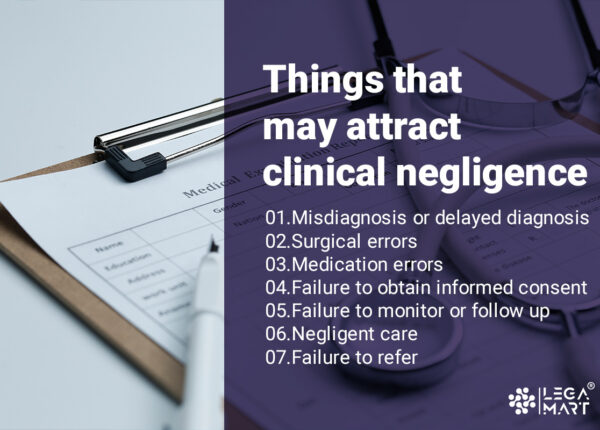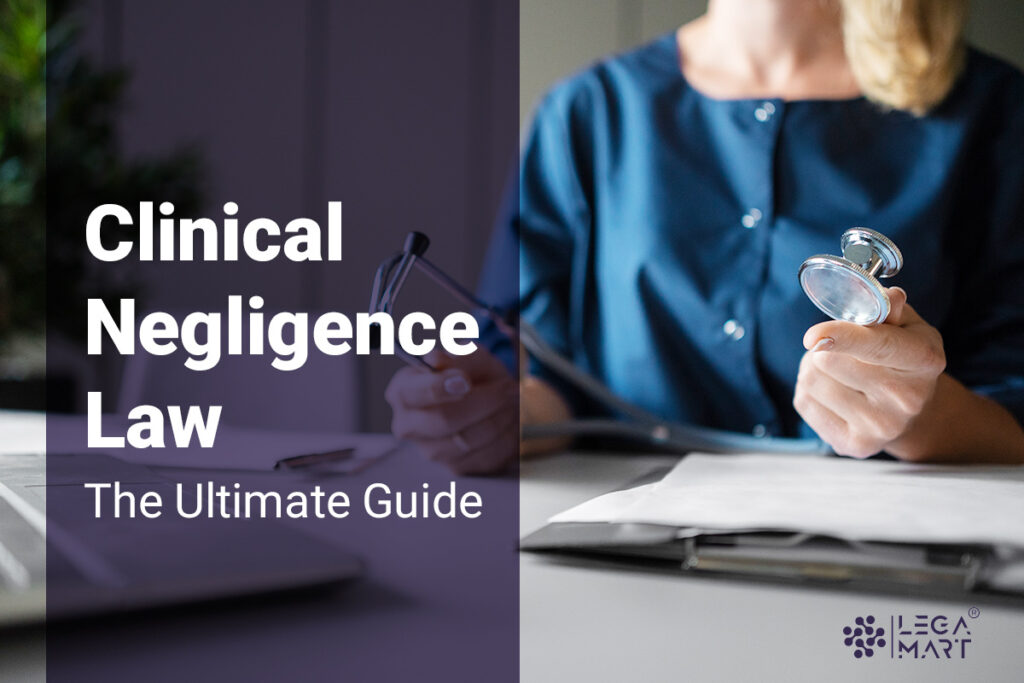Clinical negligence is a legal term that refers to a breach of duty of care by a healthcare provider that results in harm or injury to a patient. In other words, it is a failure by a healthcare provider to meet the expected standard of care in their profession, which results in harm to the patient.
Examples of clinical negligence may include misdiagnosis or delayed diagnosis of a medical condition, prescribing the wrong medication or dosage, failing to properly monitor a patient’s condition during treatment, surgical errors, or failing to obtain informed consent for a procedure.
Clinical negligence can have severe consequences for patients, including physical and emotional harm, financial costs, and loss of income or earning potential. Patients who have suffered harm due to clinical negligence may be entitled to compensation through a medical malpractice lawsuit or other legal remedies.
It is important for healthcare providers to maintain high standards of care and to take appropriate steps to prevent clinical negligence, including ongoing training and education, quality assurance measures, and open communication with patients.
What is clinical negligence law?
Clinical negligence law, also known as medical malpractice law, is a legal area that governs the liability of healthcare providers for harm or injury caused to patients as a result of clinical negligence. The law seeks to ensure that healthcare providers meet the expected standard of care in their profession and are held accountable for any harm caused by their actions.
In general, to establish a claim for clinical negligence, the patient must prove the following elements:
- Duty of care: The healthcare provider must have had a duty of care to the patient, meaning they had a professional obligation to provide the patient with a certain level of care.
- Breach of duty: The healthcare provider must have breached their duty of care, meaning they failed to provide the appropriate standard of care in their profession.
- Causation: The patient must prove that the healthcare provider’s breach of duty caused the harm or injury suffered.
- Damages: The patient must have suffered harm or injury due to the breach of duty and may be entitled to compensation for any resulting losses or expenses.
Clinical negligence law applies to many healthcare providers, including doctors, nurses, hospitals, and other medical professionals. Healthcare providers may be held liable for various acts or omissions that harm patients, including misdiagnosis, delayed diagnosis, prescribing the wrong medication or dosage, surgical errors, and failing to obtain informed consent.
Things that may attract clinical negligence

Clinical negligence can result from a wide range of acts or omissions by healthcare providers. Some common acts or omissions that can result in clinical negligence include:
- Misdiagnosis or delayed diagnosis: When a healthcare provider fails to correctly diagnose a patient’s condition or delays in making a diagnosis, the patient may suffer harm or injury.
- Surgical errors: Errors made during surgery, such as performing the wrong procedure, leaving surgical instruments inside the patient’s body, or damaging surrounding tissue, can result in harm or injury to the patient.
- Medication errors: Prescribing the wrong medication or dosage, failing to account for potential drug interactions, or administering medication improperly can result in harm or injury to the patient.
- Failure to obtain informed consent: Healthcare providers must obtain informed consent from patients before performing any procedures or treatments. Failing to do so can result in harm or injury to the patient.
- Failure to monitor or follow up: When healthcare providers fail to properly monitor a patient’s condition or follow up on test results or treatment plans, the patient may suffer harm or injury.
- Negligent care: Providing substandard care or failing to provide care in accordance with professional standards can result in harm or injury to the patient.
- Failure to refer: When a healthcare provider fails to refer a patient to a specialist or other healthcare provider when necessary, the patient may suffer harm or injury.
Clinical negligence law and compensation
Clinical negligence law enables victims of medical negligence to seek compensation for the harm and injury they have suffered. Here are some important points to consider regarding clinical negligence law and compensation:
Types of compensation available: Victims of clinical negligence may be entitled to various types of compensation, including:
- General damages: This compensates for the pain, suffering, and loss of amenities caused by clinical negligence.
- Special damages: This compensates for the financial losses incurred due to clinical negligence, such as loss of earnings, medical expenses, and travel costs.
- Future losses: If the clinical negligence has resulted in ongoing or future care requirements, future losses may be awarded.
Factors that affect the amount of compensation awarded
- Severity of the injury: The severity of the injury caused by medical negligence is a key factor in determining the amount of compensation awarded. More severe injuries, such as permanent disability or loss of limbs, will typically result in higher compensation amounts.
- Degree of negligence: The degree of negligence by the healthcare professional or institution responsible for the injury can also impact the compensation awarded. Cases in which the negligence is deemed particularly egregious may result in higher compensation amounts.
- Impact on the victim’s life: The impact of the injury on the victim’s life can also be a factor in determining compensation. This can include how much the injury has affected their ability to work, participate in hobbies or activities, and carry out daily tasks.
- Financial losses: Financial losses incurred by the victim due to the injury can also be considered when determining compensation. This can include loss of earnings, medical expenses, and travel costs.
- Age and life expectancy: The age and life expectancy of the victim can also be factors in determining compensation. Younger victims with longer life expectancies may be awarded higher compensation to reflect that they will have to live with the consequences of the injury for longer.
If you or a loved one has experienced medical negligence, having a 1-1 consultation with an experienced lawyer can be beneficial. These lawyers have the legal expertise to navigate the complexities of such cases, access expert witnesses, can evaluate the strength of your case, negotiate with insurance companies and hospitals, and provide support and guidance throughout the legal process. A lawyer can help you pursue compensation for harm or injury caused by medical negligence.




